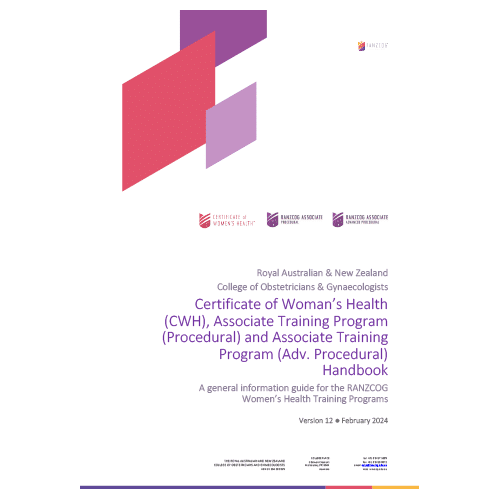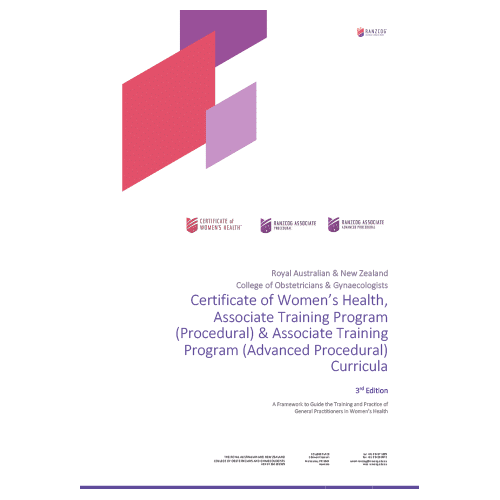Associate Training Program (Advanced Procedural) (APTP)
The RANZCOG Certificate and Procedural vocational training programs equip medical practitioners to deliver high-quality women’s health services across Australia and Aotearoa New Zealand.
Introduction
The RANZCOG Associate Training Program (Advanced Procedural) (APTP) builds on the skills developed through the basic Procedural Training Program (PTP). It’s intended for medical professionals who wish to further develop their knowledge and skills in hospital-based obstetrics and gynaecology.
The APTP can be undertaken on its own, or in combination with the Certificate of Women’s Health and/or the Procedural Training program (PTP).
Following successful completion of the APTP, you will be qualified to manage caesarean and instrumental deliveries, conduct first-trimester transvaginal/transabdominal and third-trimester scans, repair perineal tears, and perform a range of advanced procedures, including pelvic laparotomy and hysteroscopy.



Course content
Please refer to the Training Program Handbook and Curriculum for more information on the Advanced Procedural training program (APTP).
Training requirements
To receive the RANZCOG Associate Training Program (Adv. Procedural), you must satisfactorily complete all requirements outlined below within two years of commencement of training, or within four years if completing two or more programs simultaneously.
Logbook
Logbook requirements to be approved by your training supervisors
Workplace-based assessment (WBA)
A WBA is an evaluation of your clinical skills during a normal working day. During a patient encounter or procedure, your training mentor will assess your performance against the standards described for each criterion.
The APTP WBAs are:
Caesarean Delivery
Instrumental Delivery (Vacuum)
Instrumental Delivery (Forceps)
First Trimester Abortion or Miscarriage
First Trimester Ultrasound (Transvaginal)
First Trimester Ultrasound (Transabdominal)
Third Trimester Ultrasound
Trainees commencing BEFORE 1 July 2023 are required to download the WBA forms in Integrate under “Resources” and submit them as PDFs with the logbook to Certificate and Procedural Training Programs at cptp@ranzcog.edu.au
Case syntheses
All trainees must complete five de-identified written case syntheses on a range of obstetric conditions, each assessed by both training supervisors.
Trainees commencing BEFORE 1 July 2023 are required to complete the download the case syntheses forms in Integrate under “Resources” and submit them as PDFs with the logbook to Certificate and Procedural Training Programs at: cptp@ranzcog.edu.au
Please ensure that your supervisors complete separate forms, and that you submit both assessments for each case. If a case synthesis is assessed as unsatisfactory, you must repeat it until you achieve the minimal acceptable passing standard.
Cases must be:
particularly unusual and/or problematic
based on patients under your care
relevant and valuable to your current and/or intended practice
researched to ensure that the final synthesis is representative of evidence-based best practice
Workshops
Trainees commencing AFTER 1 January 2022 are required to upload Certificates of Completion in the logbook for the following workshops:
Obstetric Anal Sphincter InjurieS (OASIS)
Basic Obstetric Skills (BOS)
Trainees commencing BEFORE 1 January 2022 are required to upload Certificates of Completion in the logbook for the following workshop:
Formative appraisals (optional)
A formative appraisal is a feedback tool that provides you with constructive insights into your progress and performance.
Trainees are strongly encouraged to complete a formative appraisal with their training supervisors in the last 3–6 months of training to identify strengths and areas for further development and improvement.
Timing of the appraisal should enable you to plan the remainder of your training time and use the feedback to guide and facilitate your preparation for the final summative assessment (see below).
Summative assessments
A summative assessment is completed by your training supervisors to assess your performance against standard domains and criteria to verify your ability to practice obstetrics independently. The assessment should be undertaken during your last months of the APTP.
Trainees commencing BEFORE 1 July 2023 are required are required to download the Summative Assessment form in Integrate under “Resources” and submit it as a PDF with the logbook to Certificate and Procedural Training Programs at: cptp@ranzcog.edu.au
Examination
Please visit Certificate and Associate Procedural examinations for information and resources relating to the examination, including registration open and closing dates
Trainee feedback questionnaire
This is a confidential, compulsory questionnaire that you submit to the College at the completion of the Associate Training Program (Advanced Procedural) — it’s not for assessment purposes.
The questionnaire assesses the training hospitals, rather than individuals within hospitals, so that future training can be modified and improved. The questionnaire asks you to rate and comment on various aspects of your training, including the standard of supervision and clinical experience.
Learning development plan
A learning development plan is used if the formative and/or summative assessments identify significant concerns about your performance and progress.
Modules
The four online modules provide access to a range of dynamic resources and learning tasks. Each module is mapped to the curriculum, with clearly stated learning outcomes.
Trainees can access and complete the modules in any order, and at their own pace, via the RANZCOG e-learning system, Acquire.
The subject areas for each module are as follows:
APTP1: Advanced obstetrics
Caesarean delivery
Vacuum and forceps delivery
Repair of perineal tears
APTP2: Advanced gynaecology
Basic pelvic laparotomy
Hysteroscopy
Miscarriage
Termination
APTP3: Ultrasound
Basic pelvic laparotomy
Hysteroscopy
Miscarriage
Termination
APTP4: Postnatal and neonatal care*
*For trainees commencing from 1 January 2022.
Examination of a neonate
Management of a sick neonate
Grief counselling
Fees
Please note that the training and examination fees are payable in Australian dollars (AUD), and are not subject to Australian GST.
The College will send you instructions for payment via email.
Procedural skills grants
The General Practitioner Procedural Training Support Program (GPPTSP) aims to help overcome workforce shortages and increase the availability of obstetrics and anaesthetic services in rural and remote areas.
The GPPTSP is funded by the Australian Government Department of Health and provides up to $40,000 to eligible GPs in rural and remote areas to gain either the APTP, or a statement of satisfactory completion of Advanced Rural Skills Training in Anaesthesia.
The obstetrics component of the program is managed by RANZCOG and the anaesthetics component is managed by the Australian College of Rural and Remote Medicine (ACRRM).
Support
Member wellbeing
A range of member wellbeing services are available to trainees experiencing professional or personal difficulty during training. The College encourages you to access these supports in times of stress, anxiety or poor health.
For more information, please click to expand the sections below, or follow the link to our Member Wellbeing page.
Training committees
Please explore the links below to learn more about the committees with oversight and responsibility relating to the Associate Training Program (Advanced Procedural).
Policies and procedures
The below policies are relevant to the RANZCOG Associate Training Program (Advanced Procedural) and may be of interest.
Contact
For more information, please contact Certificate and Procedural Training Programs at: cptp@ranzcog.edu.au
Other useful contacts include:
Assessment services: assessment@ranzcog.edu.au
eLearning: elearning@ranzcog.edu.au


